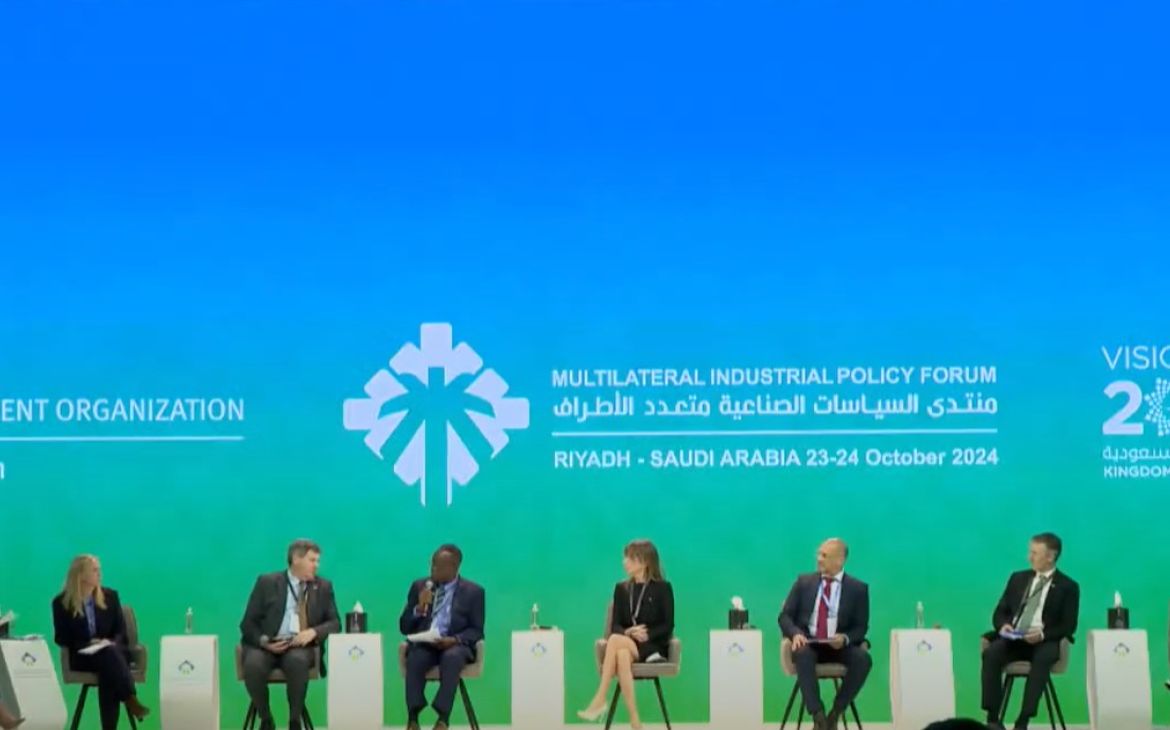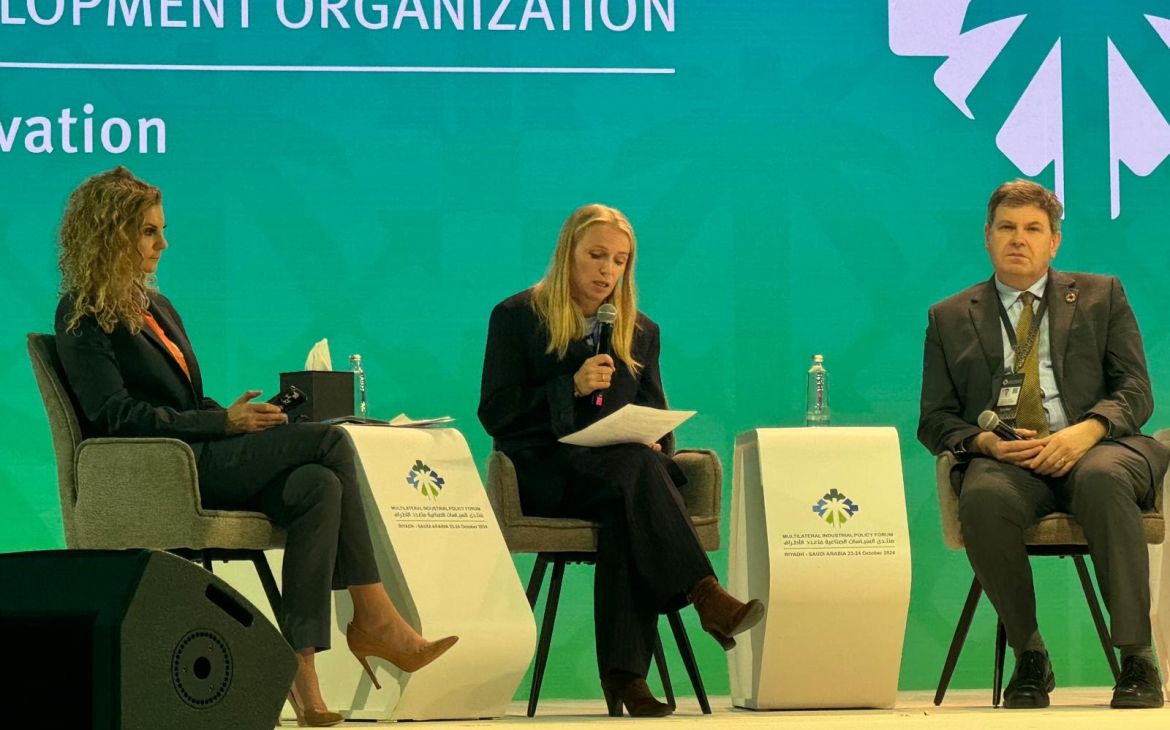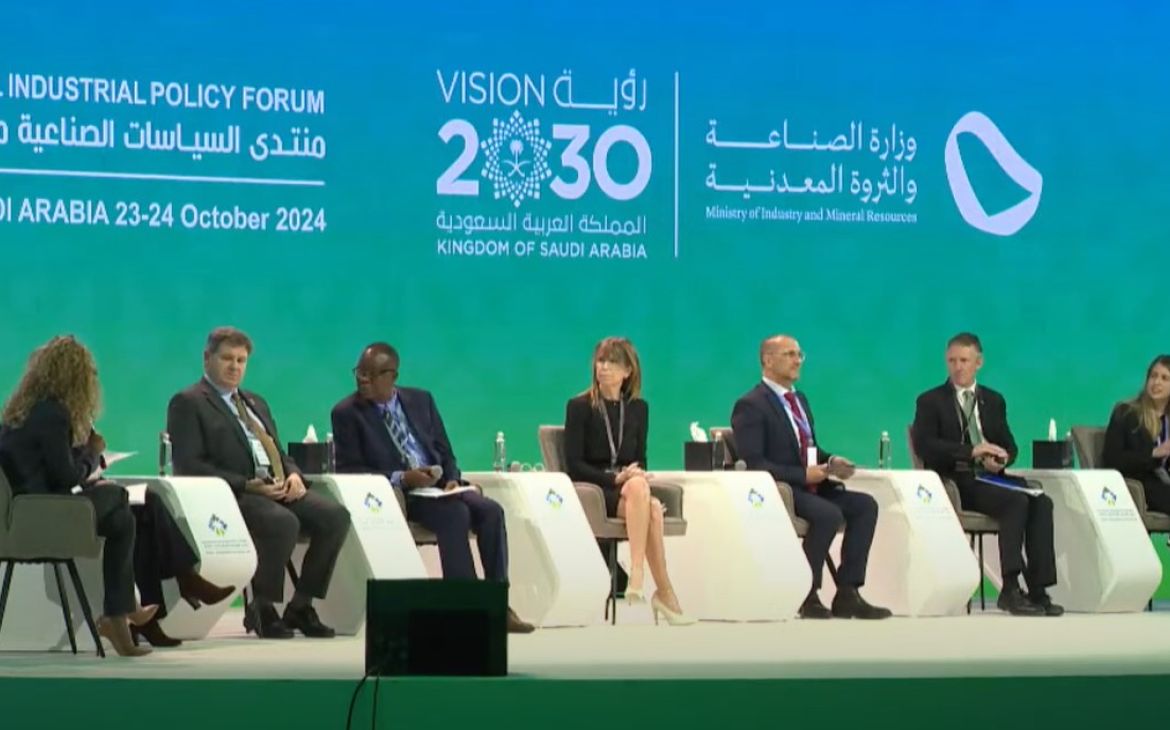18 October 2024, Geneva, Switzerland. The world is facing radical economic transformations driven, on the one hand, by opportunities offered by green and digital technologies and, on the other, by significant demographic changes, decreasing natural resource availabilities, increasing pressures from societies turning towards more responsible consumption patterns, and regulations to promote ESG compliance or encourage SDG reporting, and to pro-actively manage digital transformations. As such, one of the key needs becomes the upskilling and reskilling of government agencies, as well as private sector management and employees to support their participation in sustainable and inclusive Global Value Chains.
To address this need, UNIDO, UNITAR and SDSN have developed a concept of the Capabilities 4 the Future Hub. The concept has been informed by the work of UNSDG:Learn Partnership composed of 65+ organizations and will help fulfil its objective to provide relevant and quality sustainable development learning to all.
On 23 October 2024, UNIDO, UNITAR and SDSN with support from DLA Piper are organizing a side event “Capabilities 4 the Future Hub” at UNIDO Multilateral Industrial Policy Forum 2024 (MIPF) in Riyadh, Kingdom of Saudi Arabia. The side event will convene the main Champions of the Capabilities 4 the Future Hub and explore how the Hub can offer a space for government agencies, private sector and educational and training institutions to prepare and manage these transitions through participatory dialogue and learning strategies at global, sectoral and national levels enabling them to innovate and create the highest joint returns to prosperity, society and environment for those who participate in inclusive and sustainable Global Value Chains.
UNIDO’s Industrial Development Report (IDR) 2024 calls for industrial policies to be aligned with the Sustainable Development Goals (SDGs), and to be future-ready, collaborative and regionally coordinated. The Capabilities 4 the Future Hub is designed to support this goal by offering a space for engagement and exchange between national industrial authorities and development banks, educational and training institutions as well as businesses. The Hub will facilitate the management of transitions towards sustainable and inclusive global value chains through participatory dialogue and by providing access to learning, training, upskilling and reskilling opportunities for micro, small and medium-sized enterprises and individuals. It is proposed that the Hub be funded through voluntary contributions from committed United Nations Member States, and matched by private sector funding.
Summary
The Capabilities 4 the Future Hub side event has highlighted the importance of offering capacity-building opportunities for better coordinated industrial policies and more inclusive and greener Global Value Chains. The Hub will help identify, develop, and make available industry-specific learning targeting in particular opportunities for countries with less resources, using Open Educational Resources approaches and certifying learning quality. Liberian Deputy Ministry for Industry Hon. Andrew Paygar-Flangiah noted that the country could benefit both in terms of government capacities to modernize their industrial policy to make it fit for the SDGs and in terms of capacities of vocational education and training institutions to provide skilling opportunities for youth: “It will be critical for our Technical Vocational Education and Training, academia included, and the private sector that will play a crucial role to come together”.
Irish Ambassador to Saudi Arabia H.E. Gerry Cunningham expressed support for the Hub by emphasizing the burden of countries with less resources in the face of multiple global and other regulations and the Hub’s role in exchanging knowledge and building their capacities to level the playing field. Siegfried Leffler, Director of Operations, GIZ International Services, has pointed out that Germany has been sharing its own experience such as Mittelstand Digital Initiative with its partner countries and has offering support on sustainable economy and industrial policy to counter possible adverse effects of its domestic policies in developing countries. SDG Academy Director Prof. Patrick Paul Walsh emphasized the importance of industrial policy coordination to promote more inclusive and greener Global Value Chains while the SustainChain CEO illustrated the value added of public-private partnerships and leveraging of IT technologies to promote collaborations and knowledge-sharing. Elena Proden from UNITAR explained that the CAP4FUTURE initiative - born out of UN SDG:Learn - aims to promote partnerships at country and global levels between key stakeholders - from industrial authorities to private sector, Vocational Education and Training and Academia. The double objective is to help countries, in particular, those with less resources, to develop and implement national learning strategies supporting industrial transformations and to promote access through Hub to industry and region-specific learning, with construction and insurance sector pilots presented by Isabela Carrozza Joia from SDSN. Niki Rodousakis of UNIDO closed the discussion with a powerful call to action: “You can either go to sleep and dream, or you can wake up and take action.”
Agenda
Opening
Representative of the Kingdom of Saudi Arabia
Jeffrey Sachs, President, UN Sustainable Development Solutions Network (SDSN)
Demo and Presentation – CAP4FUTURE Hub
- Elena Proden, Senior Specialist, Strategic Implementation of the 2030 Agenda Unit, UNITAR
- Patrick Paul Walsh, Vice President of Education and Director, SDG Academy, UN Sustainable Development Solutions Network (SDSN)
Keynote
- Hon. Andrew Paygar-Flangiah, Deputy Minister for Industry, Liberia
Speakers
- Siegfried C. Leffler, Head of Operations, International Services, Deutsche Gesellschaft für Internationale Zusammenarbeit (GIZ) GmbH
- H.E. Gerry Cunningham, Ambassador of Ireland to Saudi Arabia
- Kelly Sporn, Special Counsel, International Head of Strategic Delivery – Sustainability & ESG, DLA Piper
- Jacqueline Corbelli, US Coalition on Sustainability & Creator, SustainChain
- Isabela Carrozza Joia, Programme Associate, SDG Academy, UN Sustainable Development Solutions Network, on behalf of BuildSkills Academy
Moderator
- Niki Rodousakis, Capacity Development and Policy Advice Unit, UNIDO
Q&A & Closing
Speakers
Jeffrey Sachs, President, UN Sustainable Development Solutions Network (SDSN)
Jeffrey D. Sachs is President of the UN Sustainable Development Solutions Network (SDSN), Co-Chair of the Council of Engineers for the Energy Transition, Commissioner of the UN Broadband Commission for Development, academician of the Pontifical Academy of Social Sciences at the Vatican, and Tan Sri Jeffrey Cheah Honorary Distinguished Professor at Sunway University. He is also a University Professor and Director of the Center for Sustainable Development at Columbia University. He has been a Special Advisor to three United Nations Secretaries-General, and currently serves as an SDG Advocate under Secretary-General António Guterres. He spent over twenty years as a professor at Harvard University, where he received his B.A., M.A., and Ph.D. degrees. Sachs has received 42 honorary doctorates, and his recent awards include the 2022 Tang Prize in Sustainable Development, the Legion of Honor by decree of the President of the Republic of France, and the Order of the Cross from the President of Estonia.
Elena Proden, Senior Specialist, Strategic Implementation of the 2030 Agenda Unit, UNITAR
Elena Proden is a development economist with more than 15 years of experience working for the UN at country, global and regional levels on capacity building and applied research. She currently works as a Senior Specialist and Team Leader of the Strategic Implementation of the Agenda 2030 Unit at the United Nations Institute for Training Research supporting countries on national planning and economic transformations, statistical production and dissemination, M&E, as well as higher education, TVET and academia engagement. She is also coordinating the UN SDG: Learn partnership on UNITAR’s behalf to promote better learning opportunities for different stakeholders from policy-makers, statisticians, and evaluators to businesses and CSOs.
Patrick Paul Walsh, Vice President of Education and Director, SDG Academy, UN Sustainable Development Solutions Network (SDSN)
Patrick Paul Walsh received a PhD in Economics from the London School of Economics in 1994. Dr. Walsh is a Government of Ireland, Marie Curie (Brussels), IZA (Bonn), RSA (London), EIIR (Brussels) and REPOA (Tanzania) fellow. He is currently on secondment to the UN Sustainable Development Solutions Network (SDSN) as Vice President of Education and Director of the SDG Academy.
Dr. Walsh still remains a Full Professor of International Development Studies and is the Director of the UCD M.Sc. in Sustainable Development in partnership with the SDG Academy. He was elected president of the Statistical and Social Inquiry Society of Ireland (SSISI) in 2022. SSISI is an all-island learned society established in 1847. The Society is a forum for evidence-based discussions on public policy between government departments, social partners and academia. Proceedings are published in an open science diamond Journal archived in TCD TARA and listed on the Web of Science.
Hon. Andrew Paygar-Flangiah, Deputy Minister for Industry, Liberia
Siegfried C. Leffler, Head of Operations, International Services, Deutsche Gesellschaft für Internationale Zusammenarbeit (GIZ) GmbH
Highly successful Executive with more than 20 years of international experience leading major business development and change initiatives. Proven track record in strategic planning and execution while exceeding business and financial growth targets. Demonstrated success driving operational improvement and excellence in complex, fast-paced environments. Adept in building and aligning cohesive teams across different countries in Africa, the Middle East, and Europe. Fluent in German, English, and French; good in (modern) Greek and spoken Arabic.
Kelly Sporn, Special Counsel, International Head of Strategic Delivery – Sustainability & ESG, DLA Piper
Kelly Sporn is a specialist in sustainability and ESG policy and strategy. She has sat on a number of key regulator and industry forums related to sustainability, including the Legal Taskforce for the Sustainable Markets Initiative and the inaugural cohort of the FCA-Bank of England Climate Financial Forum. She has written for/peer-reviewed a number of publications on the topic of sustainability and ESG.
Kelly has extensive in-house experience in legal, policy and business roles. Her sustainability experience is underpinned by two decades of experience in financial services and at international law firms.
She is a post-graduate student at the University of Cambridge’s Institute of Sustainability Leadership. Her research interests include approaches to sustainability in law firms and extrinsic drivers for nature-positive strategic change. Kelly coordinates the international firm’s sustainability & ESG business strategy.
Jacqueline Corbelli, US Coalition on Sustainability & Creator, SustainChain
Jacqueline Corbelli is a transformational leader who drives positive business growth and societal change. She tackles issues that define industry verticals, reshape culture and rebuild communities.
Jacqueline is the founder of the US Coalition on Sustainability, the nonprofit organization established in collaboration with the United Nations with the single purpose of unifying and accelerating progress toward achieving the Sustainable Development Goals by 2030. To achieve its mission Jacqueline created SustainChain™, a digital and machine learning technology platform that unites innovators, impact investors, purpose-driven brands, NGOs and alliances who share the vision of rebuilding global supply chains to support sustainability.
Jacqueline is also the founder and CEO of BrightLine, a technology company formed in 2003 which she continues to lead that is built at the intersection of television streaming and interactive media. BrightLine is a cornerstone of advanced TV for all of America’s leading broadcasters. As an astute executive, she saw the prospect that shifting consumer behaviour held for the future of media and, as with SustainChain and the fundamental need for new business models, the opportunity to put her change management skills to work to help redefine the relationship between the two.
Before BrightLine, Jacqueline served as President of Aston Associates, a leading advisory firm for financial institutions and their investors, where she restructured underperforming companies into beacons of the investment community. Over the course of 12 years, she directed the corporate-wide organizational redesign of 10 major corporations worldwide.
Jacqueline applies her transformational change methodologies outside of business and into the world of economic development and both governmental and non-governmental organizations. From 2010-2015, she served as Chairman of the Board of Columbia University’s Millennium Villages Project, overseeing the integrated economic development work architected by Professor Jeffrey Sachs in 10 countries across sub-Saharan Africa.
Jacqueline currently serves in leadership roles within forums of both the United Nations and the Vatican. In addition to her extensive involvement in the UN’s Sustainable Development Goals, she is a Member of the Leadership Council of the Sustainable Development Solutions Network, a Board member of the SDG Center of Africa and a Board Governor at the New York Academy of Sciences. Jacqueline also plays a leading role for the Vatican as a founding member of Pope Francis’ Ethics in Action Forum created under the auspices of the Vatican’s Pontifical Academy of Sciences, where she assists the Vatican in identifying how technology, media and data can generate justice in society.
Isabela Carrozza Joia, Programme, Associate, SDG Academy
Isabela is a Programme Associate at the SDG Academy. She mainly supports the Academy for Transitional Skills in the Built Environment (BuildSkills Academy) project in its outreach. BuildSkills Academy is an EU training programme aimed at upskilling workers in the construction sector in Europe.
Before joining SDSN, Isabela worked on sustainable development communication strategies at the OECD Development Communication Network, specializing in researching public perceptions and attitudes towards sustainable development. She holds an MSc in International Affairs from the Graduate Institute of Geneva (IHEID).
Niki Rodousakis, Capacity Development and Policy Advice Unit, UNIDO
Mrs. Niki Rodousakis is a communications and programme management professional at the United Nations Industrial Development Organization (UNIDO), and has spearheaded the development of UNIDO’s forthcoming Training Academy, a platform that consolidates all of UNIDO’s SDG 9 learning products and services. As the Communication Focal Point for the Division of Industrial Policy Advice and Capacity Development (IPC) as well as for UNIDO’s Multilateral Industrial Development Forum (MIPF), an annual forum that serves to stimulate policy discussions, knowledge sharing and mutual learning on industrial policy-related issues. Before joining UNIDO, she was a Research Fellow at the Interdisciplinary Centre for Comparative Research in the Social Sciences(ICCR) and was involved in social science research projects and policy analyses under the European Commissions Framework Programme (now Horizon Europe). She has co-authored several articles and book chapters. She recently joined the Capabilities 4 the Future Hub team as the UNIDO representative.




